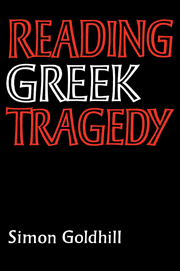Book contents
- Frontmatter
- Contents
- Preface
- 1 The drama of logos
- 2 The language of appropriation
- 3 The city of words
- 4 Relations and relationships
- 5 Sexuality and difference
- 6 Text and tradition
- 7 Mind and madness
- 8 Blindness and insight
- 9 Sophistry, philosophy, rhetoric
- 10 Genre and transgression
- 11 Performance and performability
- Bibliography
- Index
3 - The city of words
Published online by Cambridge University Press: 08 February 2010
- Frontmatter
- Contents
- Preface
- 1 The drama of logos
- 2 The language of appropriation
- 3 The city of words
- 4 Relations and relationships
- 5 Sexuality and difference
- 6 Text and tradition
- 7 Mind and madness
- 8 Blindness and insight
- 9 Sophistry, philosophy, rhetoric
- 10 Genre and transgression
- 11 Performance and performability
- Bibliography
- Index
Summary
The city is in nature prior to households and each of us individually.
ARISTOTLEIf we wish to understand the force and direction of Greek tragedy, it is impossible not to bring into consideration the city of Athens, which gave rise to the institution of the tragic festivals and which, as we saw in the previous chapter, can be regarded as offering specific conditioning to its dramas. I do not mean by this to take for granted any simple relation between a society and the texts produced in it, nor do I wish to add my name to the roll call of those who have seen in the order of the polis one of the greatest glories of Greece. Rather, in this chapter I intend to develop briefly some sense of the ideology of the polis and a view of its structure: naturally, I shall not be attempting a full description of its institutions or of its history, two topics to which many words have been dedicated, nor am I attempting to define in full the term polis, a word whose transliteration covers a multitude of insufficient translations. Rather, within the terms of this book I shall be attempting to investigate some ways in which the structure of civic ideology may relate to the dramatic festivals and the sorts of transgressions enacted in tragedy and comedy. For even if the relations between the social conditions of production and the texts themselves remain obscure and difficult, it does not follow that the texts can simply be read divorced from any sense or investigation of those conditions.
- Type
- Chapter
- Information
- Reading Greek Tragedy , pp. 57 - 78Publisher: Cambridge University PressPrint publication year: 1986
- 2
- Cited by



